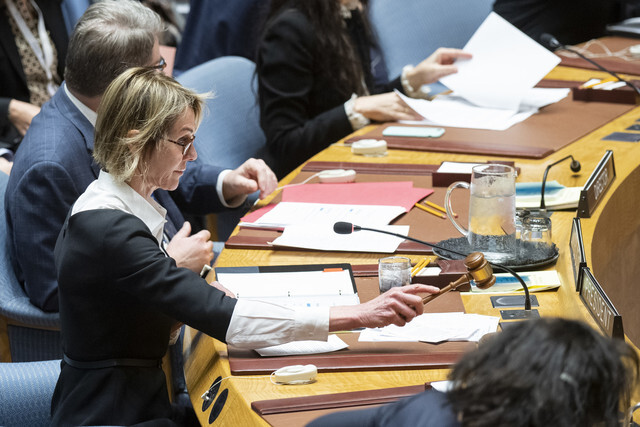hankyoreh
Links to other country sites 다른 나라 사이트 링크
China, Russia propose resolution for sanctions relief for North Korea

China and Russia proposed a resolution on Dec. 16 officially demanding the partial lifting of UN Security Council sanctions against North Korea. In response, the US argued that it was “not the time” for sanctions relief, stressing the importance of a concerted response by the international community. With Pyongyang pressing harder for a “new method of calculation” from Washington as the year’s end approached, major permanent members of the UNSC now appear to be clashing over their differences on how North Korea issues should be resolved.
China and Russia proposed a draft resolution on Dec. 16 that included the partial lifting of sanctions against North Korea, Reuters reported.
In the draft resolution, China and Russia welcomed “the continuation of the dialogue between the United States and the DPRK [North Korea] at all levels, aimed at establishing new US-DPRK relations, building mutual confidence and joining efforts to build a lasting and stable peace on the Korean Peninsula.”
The draft would reportedly exempt an inter-Korean railroad and highway cooperation project from sanctions. Other provisions include rolling back a ban on North Korean exports of seafood and textiles and nixing a requirement to repatriate North Koreans working overseas, the wire service reported. A current Security Council resolution mandates that North Koreans working in other countries be sent back home by Dec. 22.
The US voiced definite opposition to China and Russia’s draft, stating that this isn’t the time for the Security Council to be considering a hasty proposal to ease sanctions. An official from the office of the spokesperson for the US State Department pointed out that North Korea is “threatening to conduct an escalated provocation, refusing to meet to discuss denuclearization, and continuing to maintain and advance its prohibited weapons of mass destruction and ballistic missile programs.”
“US President Donald Trump remains dedicated to making progress toward the commitments made in the Singapore summit, including transforming the relationship, building lasting peace, and achieving complete denuclearization. The US remains dedicated to diplomacy toward moving forward with those goals,” the official underlined.
“The US can’t do this alone. The members of the Security Council have unanimously stated that North Korea must avoid provocations, comply with its obligations under Security Council resolutions, and participate in continuing and meaningful negotiations in order to achieve complete denuclearization,” the official went on to say.
Through those remarks, the US reconfirmed its basic position that it’s unwilling to adjust the current sanctions regime against North Korea until the North takes meaningful measures toward denuclearization and that China and Russia need to proactively take part in implementing those sanctions.
Partial sanctions relief requires UN consentThe adoption of China and Russia’s proposed partial relaxation of sanctions would require a resolution by the Security Council. Such a resolution would need the support of nine of the permanent and nonpermanent member states, which is unlikely given first opposition from the US. The reasons that China and Russia nevertheless made an official request for easing sanctions presumably include the hope of easing tensions by making a friendly gesture to North Korea and of forestalling any future efforts by the US to impose new sanctions or toughen the current ones.
When asked to comment on Dec. 17, South Korean Foreign Ministry Spokesperson Kim In-chul declined to stake out a definite stance on China and Russia’s draft resolution. “The South Korean government is closely following developments while remaining in close communication with major states on the UN Security Council. At the current stage, what’s important is the quick resumption of the North Korea-US working-level talks,” Kim said. The Foreign Ministry’s reaction appears to account for the fact that the US, which is currently negotiating denuclearization with North Korea, thinks it’s “too early” to relax sanctions.
By Hwang Joon-bum, Washington correspondent, and Kim So-youn, staff reporter
Please direct comments or questions to [english@hani.co.kr]

Editorial・opinion
![[Column] Season 2 of special prosecutor probe may be coming to Korea soon [Column] Season 2 of special prosecutor probe may be coming to Korea soon](https://flexible.img.hani.co.kr/flexible/normal/500/300/imgdb/original/2024/0426/3317141030699447.jpg) [Column] Season 2 of special prosecutor probe may be coming to Korea soon
[Column] Season 2 of special prosecutor probe may be coming to Korea soon![[Column] Park Geun-hye déjà vu in Yoon Suk-yeol [Column] Park Geun-hye déjà vu in Yoon Suk-yeol](https://flexible.img.hani.co.kr/flexible/normal/500/300/imgdb/original/2024/0424/651713945113788.jpg) [Column] Park Geun-hye déjà vu in Yoon Suk-yeol
[Column] Park Geun-hye déjà vu in Yoon Suk-yeol- [Editorial] New weight of N. Korea’s nuclear threats makes dialogue all the more urgent
- [Guest essay] The real reason Korea’s new right wants to dub Rhee a founding father
- [Column] ‘Choson’: Is it time we start referring to N. Korea in its own terms?
- [Editorial] Japan’s rewriting of history with Korea has gone too far
- [Column] The president’s questionable capacity for dialogue
- [Column] Are chaebol firms just pizza pies for families to divvy up as they please?
- [Column] Has Korea, too, crossed the Rubicon on China?
- [Correspondent’s column] In Japan’s alliance with US, echoes of its past alliances with UK
Most viewed articles
- 1AI is catching up with humans at a ‘shocking’ rate
- 21 in 5 unwed Korean women want child-free life, study shows
- 3Korea’s 1.3% growth in Q1 signals ‘textbook’ return to growth, says government
- 4Division commander ordered troops to enter raging flood waters before Marine died, survivor says
- 5[Column] Park Geun-hye déjà vu in Yoon Suk-yeol
- 6[Column] Season 2 of special prosecutor probe may be coming to Korea soon
- 7Marriages nosedived 40% over last 10 years in Korea, a factor in low birth rate
- 8[Column] Has Korea, too, crossed the Rubicon on China?
- 9‘Weddingflation’ breaks the bank for Korean couples-to-be
- 10Is Japan about to snatch control of Line messenger from Korea’s Naver?